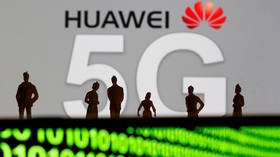Huawei now hounded over ‘oppression of Uighurs’: A day in the New Cold War on China

What connects 5G cell networks, Uighurs, and Hong Kong protesters? Apparently, they all have a role to play in a ‘Yellow Peril’ pageant this holiday season, courtesy of the mainstream media New Cold War narrative about China.
Her Majesty’s government should not work with Huawei to set up 5G networks in the UK, until allegations that the Chinese telecom giant is involved in the oppression of the Uighur minority are “comprehensively dismissed,” argues a letter signed by thirteen parliamentarians and published by the Sunday Times.
“We feel sure that you will agree that due diligence — including human rights violations and co-operation with those abusing human rights — must be undertaken, considering not only the potential reputational risks but also the profound implications for the UK’s responsibility in funding or supporting actions that would leave us accountable,” wrote the group.
More pressure on UK to “cease consideration of Huawei as contractors or partners for the UK’s 5G infrastructure” because of company complicity in Xinjiang. Letter from a group of cross-party senior MPs. https://t.co/OdKChlaQgN
— Martin Thorley 马丁 (@METhorley) December 22, 2019
While their concern with reputation and liability is touching, their insistence on treating Huawei as guilty until proven innocent is new even by the “highly likely” standards of modern Britain.
The group’s leader, Tom Tugendhat, is a retired intelligence officer and an influential Tory MP who chairs the Parliament’s Foreign Affairs Committee. Labour MP Sarah Champion is also among the signatories, as are eleven members of the House of Lords.
Yet the letter does not really stand out against the steady drip of stories about Huawei, Uighurs and China in British papers. The Telegraph has been beating the drum about the dangers of Huawei to Tugendhat’s tune for months now. On Monday, the Guardian ran a story about Huawei’s supposedly cozy relationship with the government, citing the arrest of a former employee charged with giving away trade secrets.
'This is not rule of law': detention of Huawei workers sparks backlash https://t.co/H8kXKJyrsM
— Guardian news (@guardiannews) December 23, 2019
China’s telecom giant has found itself under increased scrutiny in recent years by the media and politicians of the ‘Five Eyes’ countries – as the intelligence alliance of US, UK, Australia, Canada, and New Zealand is known. Declaring Huawei a threat to their national security, ostensibly for offering China surveillance capabilities that only they consider themselves entitled to possess, these countries have sought to embargo the company from doing business on their territory, and browbeat their allies to do the same.
In December 2018, Canada arrested Meng Wanzhou, Huawei’s CFO and daughter of the company’s founder, on charges that she violated US sanctions against Iran. She is still fighting a US extradition request.
A number of senators in Washington have actively – and successfully – lobbied for outlawing Huawei’s sales to the US military, and are pushing for banning the company from doing business in the US outright. Huawei has responded by building new devices without any US parts.
Also on rt.com ‘5G now America-free’: China’s Huawei assembles latest phones without US partsWhile it seemed that the campaign against Huawei may have been part of a broader trade war against China pursued by US President Donald Trump, tying it to the alleged persecution of the Uighurs suggests that there is more to it.
Mainstream media outlets in the ‘Five Eyes’ countries have reported as an established fact that Beijing runs “concentration camps” for Uighurs, a Muslim minority in the western Xinjiang province. The US Congress has even passed a bill allowing sanctions for these “human rights abuses.”
These claims have been amplified by the World Uyghur Congress, an outfit based in Germany, and in recent days the “pro-democracy” protesters in Hong Kong – which Beijing has been increasingly suspecting may be receiving backing from Five Eyes governments.
12.22 #HongKong citizens gather at the Human Rights Rally of Solidarity with #Uyghur. Torture, digital surveillance, arbitrary detentions, harassment of Uyghurs abroad: the humanitarian crimes that CCP commit must be stoppedUyghur today, Hong Kong tomorrow.#StandwithUyghurspic.twitter.com/HVP4tDtvIS
— Freedom HK (@FreedomHKG) December 22, 2019
Moreover, remarkably little actual evidence is offered for these claims. One of the sources is the US-backed pressure group Network of Chinese Human Rights Defenders (CHRD), whose 2018 report is based on interviews with just eight Uighurs.
The Tugendhat letter also cites a paper by the Australian Strategic Policy Institute (ASPI) – operated by the defense ministry in Canberra – and German academic Adrian Zenz, a controversial figure working with the Victims of Communism Memorial Foundation, a US-backed advocacy group. None of them offer more than rumors, speculation and vague extrapolations.
The claim that China detains millions of Uyghur Muslims is endlessly repeated in the West. However the sources for this claim are two absurdly shoddy "studies" by a US-backed NGO + far-right Christian fundamentalist Adrian Zenz. My latest w/ @MaxBlumenthalhttps://t.co/Cnp4YxtX04
— Ajit Singh (@ajitxsingh) December 22, 2019
It’s beginning to look like whatever may or may not be happening in Xinjiang – or with Huawei, or in Hong Kong – is quite beside the point, because the Five Eyes media and governments are determined to demonize China as expansionist, aggressive, threatening – even genocidal – in a bid to shore up their own perceived world hegemony.
Still not convinced? Here is Niall Ferguson – a leading neoconservative scholar perhaps best known for lamenting the demise of the British Empire in WWI – declaring in the New York Times earlier this month that a new Cold War has already begun, and it’s with China.
If The New York Times and Niall Ferguson say so.The New Cold War? It’s With China, and It Has Already Begun https://t.co/a2XL19n9Fj
— William Wang (@william_hs_wang) December 4, 2019
Turns out that Xinjiang Muslims, cell phones and Hong Kong protesters waving US and British flags do have something in common after all.
The statements, views and opinions expressed in this column are solely those of the author and do not necessarily represent those of RT.













